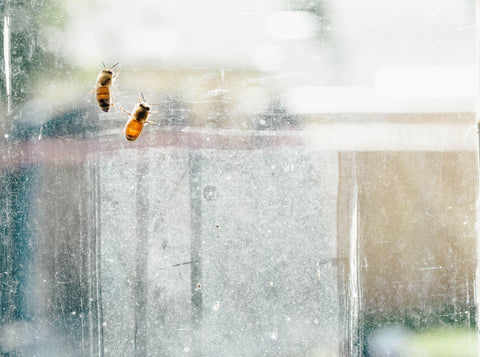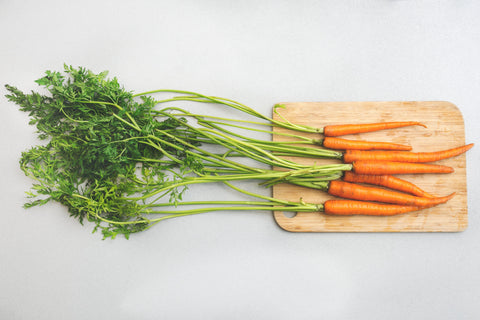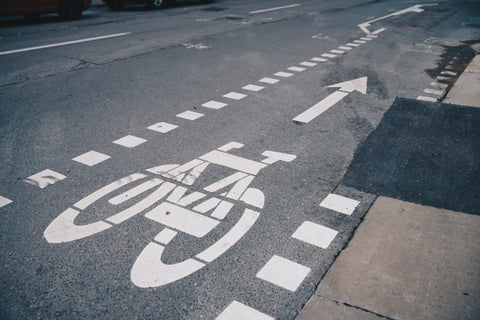Simple Ways to Make a Big Impact

Most of us know our everyday habits rely on convenient systems that have negative impacts on our society and our planet, but because these systems are just so convenient and our role seems so small, it’s easy to just kind of… not really think about it. While the food going bad in your fridge or your daily 2-hour commute isn’t going to be the straw that breaks the camel’s back, planet-wise, you might not realize how much your habits are costing you as an individual. We’ve come up with a few simple steps you can take to alleviate your impact on the earth while helping your wallet stay green as well. (See what we did there?)
1. How to Save the Bees

You’ve surely heard about how pesticides, climate change and trapping have led to the decline of bee populations and even one North American bee being placed on the list of endangered species. If you've ever had a negative encounter with a bee that might not seem like such a bad thing, but bees are responsible for pollinating the plants we depend upon for food products and livestock feed. Without the bees, some of our favorite foods would skyrocket in cost or become non-existent. Creating a Bee Hotel is a great way to assist the local bee population. Just make sure you put it somewhere out of the way where you won't routinely encounter the bees.
You'll get extra benefits from planting pollinator-friendly plants next to your Bee Hotel. Herbs like sage, lavender and rosemary are on this list, as well as blueberries, strawberries and onions. You'll save cash on groceries, have fresh produce on hand and lend a helping hand to the bees. Win, win, win!
Photo credit: Bruno Passos
2. How to eliminate food waste

This is a particularly hard problem to tackle if you eat out a lot. Ever since the 1980s, restaurants have been doling out larger portions that have led to both overeating and food waste. If you're trying to be good about sticking to your diet, it can be tempting to leave that food on the table, but simply asking for a doggy bag to take with you is a step that many people don't actually take. Dividing your meal into two portions is a great way to cut the cost per serving and eat a more reasonable portion size. Reduce landfill waste (see below) by bringing your own reusable container or bento box. Another alternative is to split a plate with a friend if you can both decide on what you'd like to order. Though you won't have lunch for the next day, this can be a convenient way to make eating out more affordable and ensure that most, if not all, the food is eaten.
A lot of us diligently go to the grocery store and buy a bunch of food we think will make us healthier and save us money - but never actually cook it. A lot of fruits and veggies go bad in the fridge because we promise ourselves we'll stop eating out so much and then cave once our friends invite us out or we order in because we're too tired to cook. Making one day out of the week your "meal prep" day and creating ready-to-eat dishes that you can pop in the oven is a great way to actually use your ingredients. Plus, it's easier to invite people over for dinner when you know you won't have to entertain them while trying to cook. Making dinners a part of your social routine is a great way to control the portions you eat and the ingredients you use. Plus, it means you'll score some free dinner when your friends invite you over to their houses.
Photo Credit: Sarah Pflug
3. How to reduce landfill waste

Simply put, a municipal solid waste landfill is an area of land designated for holding untreated waste. It's not just soda cans and styrofoam cups that can end up in these landfills; larger items like broken beach chairs, furniture, and certain appliances may end up there as well. Garbage is often dumped into holes, compacted and paved over with dirt, effectively "filling the land" with metal, plastic, food products and other materials. Unfortunately, this method of waste disposal can lead to groundwater pollution.
Many of the items that end up in landfills are disposable packaging. You can drastically cut down on the number of disposable items you use by replacing them with reusable versions, such as cloth shopping bags or thermoses for your morning coffee. Some stores even offer discounts for customers bringing back their reusable containers because this helps them cut costs too. Avoid purchasing single-use items that are not only more expensive but also come individually packaged.
Plastic is inevitable in our world, but being a little more thoughtful with how we consume it can make a big difference for our environment. Save your plastic fast food cups and rinse them out for use at home. If you don't want to drink out of them again, you can always use them as storage containers for small items. The same goes for plastic utensils - you can wash them and stash them in your car, your bag or wherever might be handy for an impromptu meal. And don't throw those extra napkins away - that's like throwing cash down the drain! You never know when you'll need an extra napkin.
Photo Credit: Matthew Henry
4. How to lessen commuter emissions

Unfortunately, the infrastructure in the United States makes owning a car a near-necessity, especially in rural areas where public transportation or ride-sharing services like Lyft aren't available. Hitching a ride with a friend or coworker (or having someone hitch a ride with you) is a great way to cut down on the often rising cost of gas. A lot of cities often have public shuttles, especially for elderly and disabled members of the community. Biking to work is another great way to save on gas and get in your exercise for the day. Installing a basket for your purse or briefcase, arriving a little extra early to change into your work clothes and packing baby wipes, dry shampoo and extra deodorant can make biking more practical. Just make sure your biking clothes are reflective and that you have reflectors or lights on your bike in case you have to head home after the sun goes down.
If biking and public transportation aren't viable options for you and you don't have anyone to carpool with, you can still reduce your impact by grouping errands together, or "trip chaining". If you normally grocery shop on a Monday but the store is next to the gym you work out on Thursday, consider switching your shopping day. The EPA has additional tips on how to reduce engine emissions while driving.
Lessening your impact on the planet doesn't have to be difficult or drastic, but you will need to consider your habits mindfully and adjust as necessary. It can be easy to get discouraged once you realize just how much pollution is occurring on a daily basis, but don't give up! If we all make small changes to our lifestyle, we'll soon see a big difference in our finances, our communities and our planet.
Photo credit: Nicole de Khors
Got any additional tips for reducing pollution and saving money? Let us know in the comments below!
